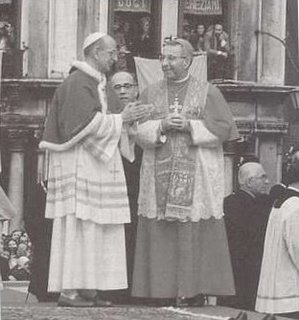Pope Paul VI (l) with Cardinal Luciani (r)

One of the questions Allen asked Fr. Lorenzi was, prior to becoming pope, did Luciani express a positive view of contraception? Lorenzi answered in the affirmative. Then-Bishop Luciani's journal from the Council shows that he hoped the commission, appointed by John XXIII before his death, to study the matter of birth control, would recommend and the pope would accept and change Church teaching on this matter. "Another factor," according Allen, that fuelled Luciani's hope for a change on this matter "was the 'spiritual trauma' the issue was causing for married couples, for whom it represented a 'laceration of conscience.'"
While bishop of Vittorio Veneto, a suffragan diocese to Venice, he was asked by the Patriarch of Venice, Giovanni Cardinal Urbani, to write a report on contraception for the bishops of the Triveneto region of Italy. In this report he took a rather positive view of contraception. When Pope Paul VI, according Allen, "got wind of the thinking in the Triveneto and sent his personal theologian, Msgr. Carlo Colombo, to meet with the bishops. Sources say that during the closed-door session, Luciani argued that Colombo’s position was 'too abstract' and did not take account of the real-life struggles of couples."
In the spring of 1968, just before the Pope's promulgation of Humane Vitae, Luciani gave a series of presentations in parishes of his diocese. In one parish, he was asked about birth control. His response was audio recorded, and is as follows:
"For me, this is the most serious theological question that has ever been dealt with by the church," the bishop said. "In the age of Arius and Nestorius, the issue was the two natures of Christ, and these were serious questions, but they were understood only at the very top of the church, among theologians and bishops. The simple people understood nothing of these things and said, 'I adore Jesus Christ, the Lord who has redeemed me,’ and that was it, there was no danger. Here, on the other hand, it’s a question that no longer regards solely the leadership of the church, but the entire church, all the young families, the young Christian families. It is a truly central point that they are still studying."
A few months later, on 25 July 1968, Paul VI promulgated Humane Vitae, Luciani’s adherence was immediate and unwavering, as befit him as a bishop. Four days after the encyclical appeared, Bishop Luciani, Allen tells us, despite his presentations in the Spring, wrote to his diocese:
"I confess that I had hoped in my heart that the extremely grave difficulties could be overcome and that the response of the magisterium, which speaks with special charisms and in the name of the Lord, could have coincided, at least in part, with the hopes held by many spouses." But, Bishop Luciani wrote, the Pope had settled the matter and the only Christian response is assent. He continued, writing that the Pope "knows that he is about to cause bitterness for many; he knows that a different solution would probably have drawn greater human applause; but he’s put his trust in God, and in order to be faithful to His word, he re-proposes the constant teaching of the magisterium, in this most delicate matter, in all its purity."
Nonetheless, Allen clearly states, it is "virtually certain [Luciani] would not have reversed Paul VI’s teaching. The church does not lurch from position to position like that, and Luciani was no doctrinal radical."


No comments:
Post a Comment